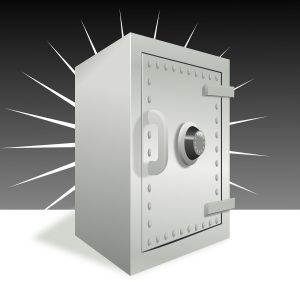1. to crack/crunch/creak 
[verb]
[kra-ken, kraak-te, ge-kraakt]
 Three common translations of “kraken” are covered in today’s DWOTD. The first translation regards the sound associated with the verbs “to crack, crunch, creak”. Depending on the pitch of the sound that a cracking door makes we also use the verb “piepen” (to creak, squeak).
Three common translations of “kraken” are covered in today’s DWOTD. The first translation regards the sound associated with the verbs “to crack, crunch, creak”. Depending on the pitch of the sound that a cracking door makes we also use the verb “piepen” (to creak, squeak).
Examples:
– “Toen ik klein was heb ik eens walnoten gekraakt tussen de deur. Sindsdien kraakt de deur bij het openen en sluiten.”
(“Once, when I was little, I used the door to crack some walnuts. Ever since the door cracks when opening or closing.” Literally “…have cracked walnuts between the door”.)
– “Heb weer heel slecht geslapen. Het bed van de buren kraakt nogal, als je begrijpt wat ik bedoel…”
(“Once again I did not sleep well. The neighbours’ bed rather creaks, if you know what I mean…” Lit.:”Have slept badly again.”)
– “Ik haat de winter en zou het liefst emigreren!” – “Echt waar? Vind je het dan ook niet leuk als de sneeuw onder je voeten kraakt?”
(“I hate the winter and woud really like to emigrate!” -“Really? Then don’t you like it when the snow crunches underfoot?“)
Expressions:
– “Het vriest dat het kraakt”: there is a sharp frost, very cold (while frosty). Lit.: “it freezes that it cracks.”
Related words:
– Kraker: (smash) hit song [noun] [de kraker, de krakers].
– Piepen: to squeak, to creak [verb] [piepte, gepiept].
– Chiropractor: chiropractor [noun] [de chiropractor, de chiropractors].
– Bottenkraker: bonesetter, slang for chiropractor/osteopath (literally “bone cracker/cruncher”).
Example:
– “Ik heb morgen een afspraak bij de chiropractor.” – “Chiropractor? Bottenkraker zal je bedoelen!”
(“Tomorrow I have an appointment with the chiropractor.” – “Chiropractor? Surely you mean ‘bone cracker’!”)
– De Notenkraker: the Nutcracker [ballet, Tchaikovsky].
2. to crack/hack 
[verb]
[kra-ken, kraak-te, ge-kraakt]
 Here the verb “kraken” is commonly used as illustrated below. Although not necessarily semantically correct, ‘kraken’ is used for breaking codes, security, (into) computers, passwords, safes etc.
Here the verb “kraken” is commonly used as illustrated below. Although not necessarily semantically correct, ‘kraken’ is used for breaking codes, security, (into) computers, passwords, safes etc.
Note that the Dutch have adopted the ‘hacker/cracker’ terminology from English.
Examples:
– “De bankovervaller had geen enkele moeite om de kluis te kraken.”
(“The bank robber had no trouble at all in cracking / breaking into the safe.”)
– “Ondanks de nieuwste technieken is de beveiling na twee dagen alweer gekraakt.”
(“Despite the (use of the) latest technology once more the security was broken after only two days.”).
Related words:
– Hersenkraker: brainteaser [noun] [de hersenkraker, de hersenkrakers].
– Kluis: safe [noun] [de kluis, de kluizen].
– Code: code [noun] [de code, de codes].
– Lek: faulty, leaky [adjective].
3. to break into … with the intention of squatting 
 [verb]
[verb]
[kra-ken, kraak-te, ge-kraakt]
A ‘squatter’ in Dutch is a ‘kraker’: somebody who (unlawfully) occupies an uninhabited building. The Netherlands have a tradition of squatting. Recently the law has changed regarding “kraken”, making it now officially forbidden. Read more in the ‘Extra’ below.
Examples:
– “Ik ben er eens getuige van geweest hoe een pand werd gekraakt.”
(“Once I was witness to the squatting of a building.”)
Related words:
– Kraker: squatter [noun] [de kraker, de krakers].
– Krakersrellen: riots involving squatters, or resulting from eviction of squatters [noun] [de krakersrel, de krakersrellen].
– Kraakpand: squat, building inhabited by squatters [noun] [het kraakpand, de kraakpanden].
Example:
– “In Amsterdam zijn veel kraakpanden. Het komt het stadsbeeld niet altijd ten goede.”
(“Amsterdam has many squats. Not always this is an improvement to the townscape.”)
– Antikraak: preventing from being squatted [adverb].
Example:
– “Huur je dit pand?” – “Nee, ik zit hier antikraak.”
(“Do you rent this building?” – “No, I live here to prevent it from being squatted”).
Extra:
With shortage of housing a consistent theme in society since the 70s, some choose to protest by occupying uninhabited buildings while at the same time claiming their right to a place to live. This is not necessarily applauded by those seeking housing outside the squatting scene (that is, almost everybody else in the Netherlands). Although now officially forbidden (since October 1st 2010) not necessarily this means that any squat can be evicted. Read more here.
Riots involving squatters, or occuring as a result of eviction of squatters, are called “krakersrellen” in Dutch. The most infamous ‘krakersrellen’ happened in 1980 when Beatrix was crowned queen of the Netherlands. These events are also referred to as the “Kroningsoproer“: the ‘coronation revolt’. The slogan back then: “geen woning, geen kroning!” (‘No housing, no coronation!’).
![]()
With "bak" meaning "bin, can, container, tray" this expression makes you think it's about getting the cat in the (cat's) box, which in fact can be very difficult (unless the cat wants to of course 🙂 ). However, "kat" in this expression may in fact mean "money" and the original meaning could be "bringing in the cash" (read more here (in Dutch) ). These days however, you will use it to say that something is very easy, or can be 'considered done!'

 Here the verb “kraken” is commonly used as illustrated below. Although not necessarily semantically correct, ‘kraken’ is used for breaking codes, security, (into) computers, passwords, safes etc.
Here the verb “kraken” is commonly used as illustrated below. Although not necessarily semantically correct, ‘kraken’ is used for breaking codes, security, (into) computers, passwords, safes etc.